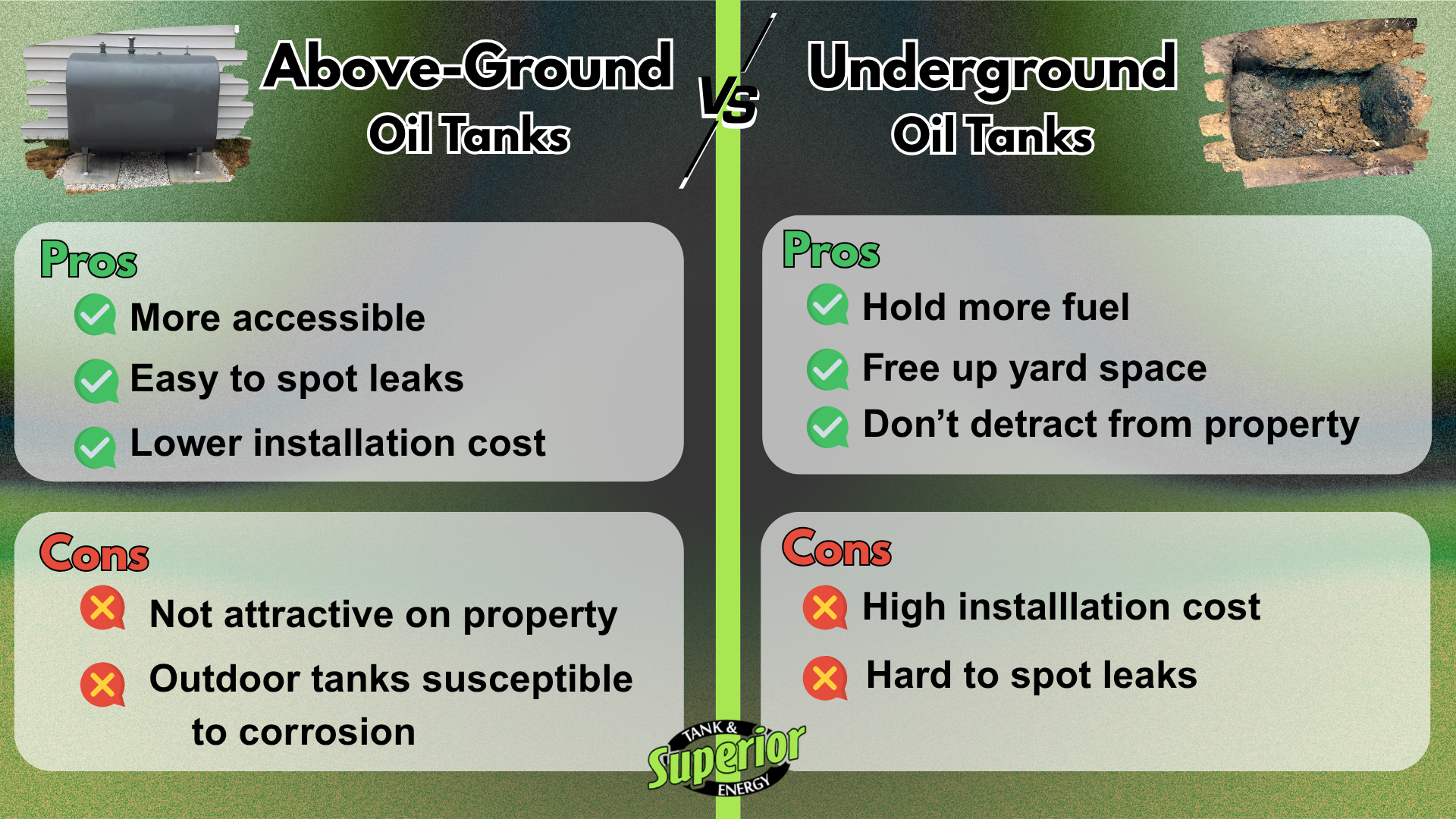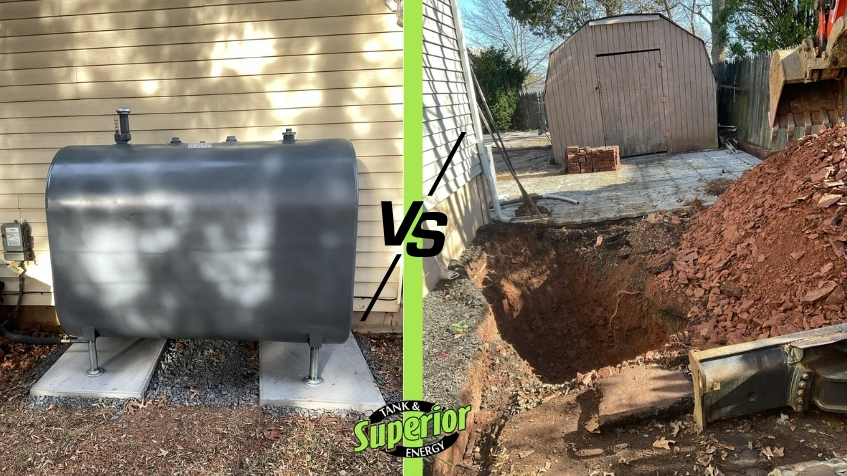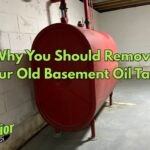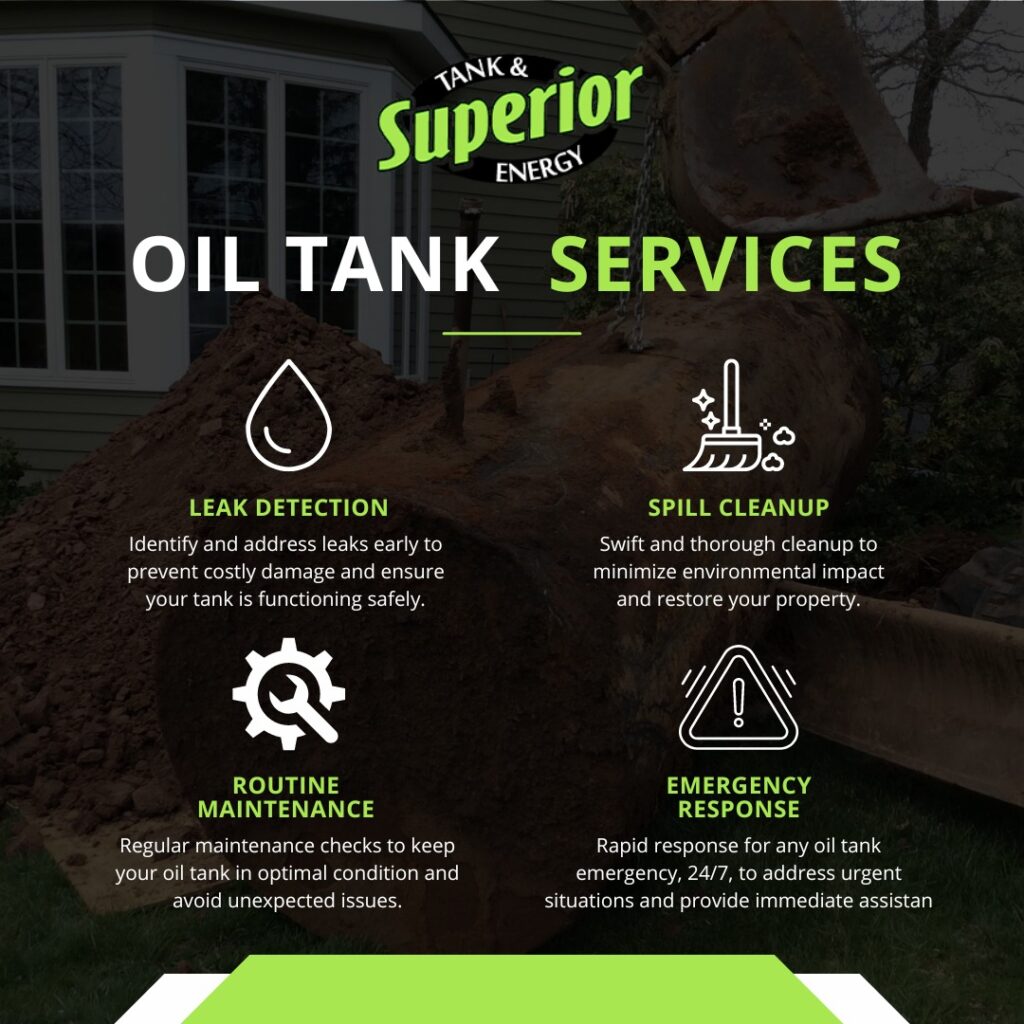- Posted by: Superior
- 0 Comments
Above-Ground vs. Underground Oil Tanks: Which Is Better?
Above-Ground vs. Underground Oil Tanks: Which Is Better?
If you’re looking to replace or install a new oil tank, you have two options: above-ground and underground oil tanks. But which type is the safest, most cost-effective, and most practical for your property? Each type has its own pros and cons, making the decision more complex than it may initially seem. In this blog, we’ll explore the key differences, pros and cons, and considerations to help you choose the best type of oil tank for home or business.
Superior Tank & Energy provides comprehensive oil tank installation options and replacement services, ensuring that you select the right tank for your needs and property layout.
Overview of Oil Tank Types
What Are Above-Ground Oil Tanks?
Above-ground oil tanks are installed outside of the home, either in the yard, basement, or garage. These tanks are typically constructed from steel or fiberglass and are easier to access for maintenance and inspections.
Here are some common uses for above-ground oil tanks:
- Residential heating systems: Above-ground oil tanks provide accessible and reliable heating for residential properties.
- Small commercial properties: Above-ground tanks are a cost-effective option for small commercial properties due to lower installation costs and easier maintenance access.
- Backup heating for emergency generators: Above-ground tanks provide a steady fuel supply for emergency generators, ensuring consistent heating during power outages.
What Are Underground Oil Tanks?
Underground oil tanks are buried below the surface and connected to the heating system through a series of pipes. They are less visible but more challenging to access for inspections and repairs.
Here are some common uses for underground storage tanks (USTs):
- Large residential properties: Underground tanks provide higher fuel capacity without occupying yard space, making them ideal for large properties.
- Commercial facilities with limited outdoor space: Underground tanks preserve outdoor space and maintain the property’s appearance.
- Aesthetic concerns: Underground tanks are a discreet option for properties where above-ground tanks would detract from curb appeal.
Pros and Cons of Above-Ground Oil Tanks
When choosing between above-ground vs. underground oil tanks, consider the benefits and challenges of each. Below are some common above-ground oil tank pros and cons:

Pros of Above-Ground Oil Tanks
- All components of above-ground tanks are easily accessed, making them easier to inspect and maintain.
- Above-ground tanks are generally less expensive to install than underground tanks, making them a cost-effective option.
- Leaks in above-ground tanks are easier to detect and address quickly, reducing environmental risk.
Cons of Above-Ground Oil Tanks
- Above-ground tanks are more visible, which may detract from property aesthetics, especially in residential areas.
- Outdoor tanks are more susceptible to rust, corrosion, and other environmental factors, increasing the need for regular maintenance.
Pros and Cons of Underground Oil Tanks
Next, we’ll review some of the advantages of underground storage tanks, as well as common drawbacks.
Underground Oil Tank Benefits
- Underground tanks free up yard space and remain less visible, maintaining the property’s appearance.
- Underground tanks can accommodate more fuel, making them ideal for large properties or businesses with higher heating demands.
Underground Oil Tanks Drawbacks
- The installation cost for underground tanks is higher due to excavation and specialized equipment, increasing upfront expenses.
- Leaks in underground tanks can go undetected for longer periods, leading to potential soil contamination that may require extensive remediation.
Key Considerations When Choosing an Oil Tank
Before deciding between an above-ground or underground oil tank, it’s important to weigh several key factors that can impact installation, maintenance, and overall performance.
- Property layout and space: Residential oil tanks installed above ground require sufficient outdoor space, while underground tanks are ideal for properties with limited room.
- Budget: Above-ground tanks generally cost less initially but may require more frequent maintenance due to weather exposure.
- Environmental regulations: Certain states, including New Jersey, have strict guidelines for underground oil tanks. Check with the NJDEP for specific requirements.
- Maintenance access: Above-ground tanks are easier to access for inspections, while underground tanks may require excavation for repairs.
- Longevity and safety: Underground tanks are less exposed to weather but more prone to undetected leaks. Above-ground tanks are more susceptible to rust but are easier to monitor.
Cost Comparison: Above-Ground vs. Underground Oil Tanks
For many people, cost is a deciding factor when choosing between an above-ground or an underground oil tank. Here are some average cost estimates from Forbes:
- Above-ground tanks: Generally, installation costs between $1,500 and $2,500, depending on size and material.
- Underground tanks: The cost can range from $2,500 to $5,000, with additional costs for excavation and leak detection systems.
When evaluating oil tank comparison, consider both upfront costs and potential long-term expenses, such as leak detection and remediation.
Which Oil Tank Is Best for You?
Choosing the right type of oil tank can have a significant impact on your property’s safety, efficiency, and overall heating costs. Here’s a quick guide to help you decide based on your specific needs:
- For homeowners: Residential oil tanks that are above-ground are typically recommended for properties with ample outdoor space, as they are more cost-effective and easier to inspect.
- For commercial properties: Underground tanks provide higher capacity and preserve outdoor space, making them ideal for larger facilities.
- When to replace your tank: If your current tank is over 20 years old, showing signs of rust or leaks, or failing inspection, it’s time to consider a replacement. Schedule a tank inspection to assess the condition of your tank and discuss installation options.
Ready To Install or Replace Your Oil Tank?
Making the right choice between an above-ground and underground oil tank can significantly impact your property’s safety, environmental impact, and heating costs. If you’re unsure which option is best for your home or business, Superior Tank & Energy can help. Contact us today to schedule a consultation or learn more about our comprehensive oil tank installation options throughout Pennsylvania and New Jersey, including the following areas:
Pennsylvania
New Jersey
- Burlington County
- Camden County
- Gloucester County
- Hunterdon County
- Mercer County
- Monmouth County
- Ocean County
Categories
Recent Post
Archives
- December 2025
- November 2025
- October 2025
- September 2025
- May 2025
- April 2025
- March 2025
- February 2025
- January 2025
- September 2024
- September 2023
- July 2023
- May 2023
- March 2023
- January 2023
- November 2022
- July 2022
- May 2022
- March 2022
- January 2022
- November 2021
- September 2021
- July 2021
- April 2021
- December 2019








Recent Comments